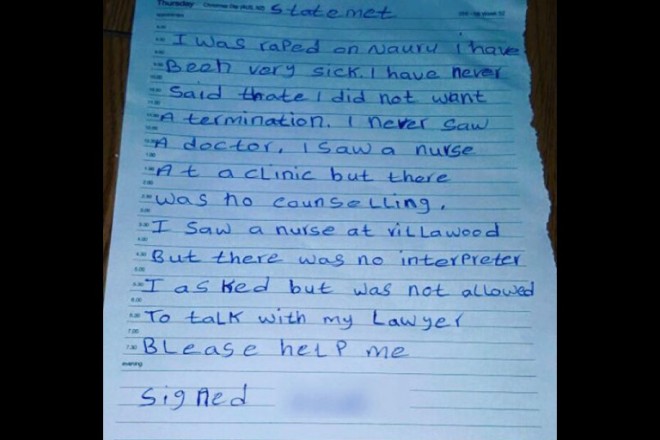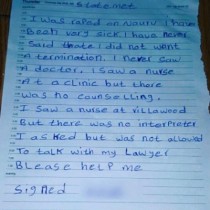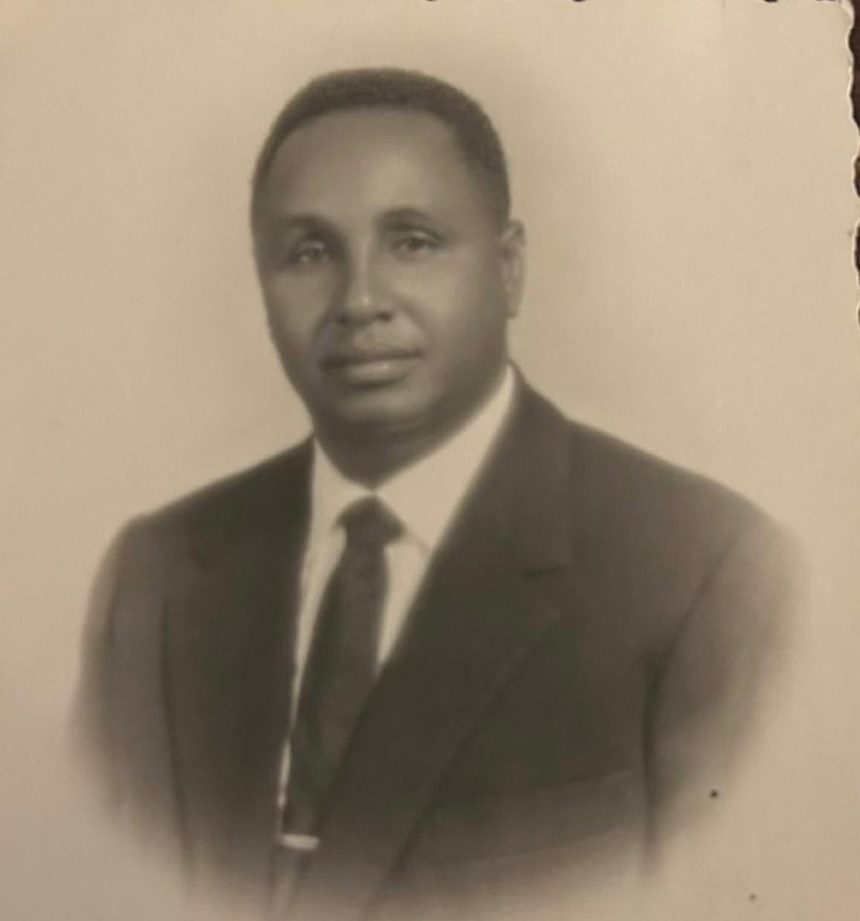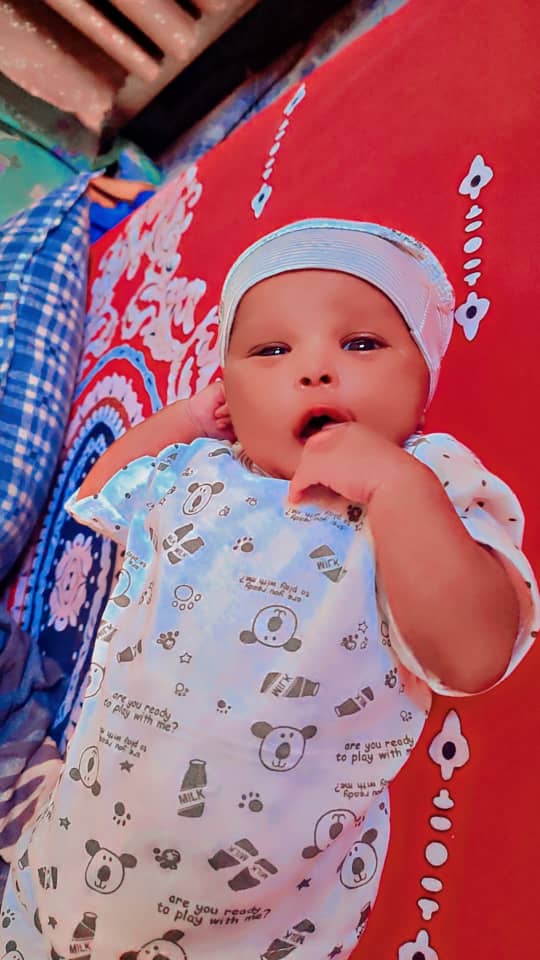
The Media's Mishandling Of Abyan's Case Proves We Need To Listen To Rape Survivors
advertisements
I can't speak for all survivors, but when I divulge my most painful secret, it's not to persecute the men responsible. I'm just asking to be believed. I was first raped when I was 14 years old. The second time, I was 15.

Trigger warning: this article details incidents of sexual assault.
As her lawyer George Newhouse continues to seek her appropriate medical care outside of Nauru, Abyan is now entering the second trimester of her pregnancy, in the same place where she was raped, where her rapist walks free
When I first told a close friend a few months ago, we
were drunk; I’ve never volunteered the story sober. She didn’t simply
say she was sorry for what had happened to me. She didn’t ask how I felt
about it today, or if there was anything she could do. Instead she
asked for details. "Where was I?”, and, "Like, okay, so what happened”? I
wasn’t left bloodied, no. Neither rapist held a knife to my throat down
a dark alley, no.
The reason behind her curiosity, it seemed, was to decide for herself if it was "rape rape”. You know, "real rape”.
I, meanwhile, was just asking for her to believe me.
It took me around seven years to tell anyone that I had been raped. In fact, it’s estimated that most incidences of sexual assault in Australia go unreported. When we consider the recent, horrific case of "Abyan”, and the way the mainstream press and its audience have failed to respect her wishes, or believe her at all, we’re reminded why that is.
Abyan is the pseudonym given to the now widely-reported case of a 23-year-old Somali refugee currently on Nauru. Last month, Abyan requested an abortion for a pregnancy, which she says is the result of a rape that took place in July, after her release from detention.
Around six weeks later, on October 11, Abyan was brought to Australia (abortion is illegal on Nauru). She was returned to Nauru without an abortion after, she claims, she was refused the counselling she needed to make the decision.
Abyan didn’t report the assault to police. All she asked for was appropriate medical care, counselling and a translator, so she could make informed choices for, and reclaim control over, her violated body.
Abyan reportedly told supporters in Australia that she did not alert Nauruan police as she was afraid of people finding out about her claim; on a tiny island with a small population, it would be extremely difficult for a woman to feel safe, especially if her rapist was still walking free. By not offering her the treatment she deserves, forcing her to go public, and demanding she explain herself, we’ve created the exact reality for Abyan that she was afraid of.
Enter: Chris Kenny
Last week, Chris Kenny — associate editor and columnist at The Australian, and former chief of staff and spin doctor for the Liberal Party — became the first foreign journalist to be granted a visa to Nauru in years. Upon entering the island nation, his first interest was to find Abyan. He went to her home, and, with her roommate translating, asked Abyan to reveal the details of her rape, who raped her, and whether or not she still wanted an abortion.
According to Pamela Curr — a campaign manager at the Asylum Seeker Resource Centre in Melbourne, who has been in continuous contact with Abyan — Kenny refused the Somali refugee’s request to leave, and pressured her to have her picture taken.
"The young woman on the phone [Abyan] was distressed, and repeatedly asking him to leave,” Curr told Crikey. "Why didn’t he do so?”
Kenny has repeatedly denied her claims outright on Twitter: "Pamela Curr tells malicious lies. She cannot be trusted. Curr has lied about events on Nauru.”
But by his own words, Abyan "initially suggested she would have nothing to say”; unwittingly, Kenny himself had implied that she didn’t want to speak. She was "agitated and distressed”, Kenny wrote, when she reiterated, again, that she was raped. "She refused to say whether the alleged assault was committed by another refugee, a Nauruan or someone else.”
Kenny never suggested that Abyan had fabricated her claim, but his article certainly attracted readers who think she is either lying, or using her rape as some kind of ploy to go "country shopping” for the best resettlement. They seem to assume that Abyan’s claims are not genuine — evidenced by her refusal to file a police report, a fact which Kenny underlined again in a follow-up piece, ‘Refugee declines to report rape to police’.
"She is a selfish opportunist, nothing more, nothing less,” one reader wrote in the comments section. "Lying parasite,” said another.
"ZERO evidence that #Abyan was raped.”
"she has lied trhough her teeeth about the entire affair”
"She’s lying to get a free ticket to Australia”
The attitude of Kenny’s readers comes in the context of Immigration Minister Peter Dutton’s recent charge that around 200 refugees on Nauru are involved in a "racket”, being transferred to Australia ostensibly for medical treatment, before applying for an injunction in the High Court to be resettled in Australia. "We aren’t going to be taken for mugs,” he said. It may have been unintended, but Kenny’s second piece reinforced the suspicion that that’s what’s happening here: "Abyan declined to say why she had not reported her alleged rape,” he wrote.
Just days before Chris Kenny’s first visit, Abyan signed a handwritten letter, sent out by her lawyers, which stated that she was raped and that she still wanted an abortion. But it wasn’t enough.
Soon after her first interview with him, Abyan went to hospital; Fairfax later confirmed that she complained to detention centre staff of being "harassed” by the columnist.
PSA: Listen To Survivors
The first time I was raped, the boy, who was also 14, swore at me when I rejected him, and pinned me down.
Around six months later, I passed out drunk at a party and awoke to find a different boy pouring his urine down my throat, from a beer-can. I was later told what else he’d done to my body.
Friends of my second rapist harassed me on MSN messenger (it was the noughties) in the months that followed. I was forced to see them at school most days, but tried to ignore them. When someone asked if we’d had sex, I was told it was "mean” of me to say "I didn’t want to have sex with him”. But I didn’t want to, I was unconscious; before I was unconscious, I’d been pushing him off me.
Few believed me; fewer still are likely to believe a refugee woman. It’s no wonder we keep our trauma under wraps — even if it makes the world less likely to believe us later.
A follow-up editorial in The Australian, which defends Kenny’s reporting, rightly notes that Abyan "was entitled to speak”. It’s an important point. She should have the right to speak, should she wish to. But it should be on her own terms, and she should provide only the details she is comfortable with. That doesn’t appear to be what has happened here.
Kenny concluded his first article by referring to the other known case of a Somali refugee, "Najma”, 26, who was also allegedly raped on Nauru.
"Police have investigated that complaint and determined that it was fabricated,” Kenny wrote, before quoting Nauruan Police Commissioner Corey Caleb as saying: "The investigation is put aside until we have any strong evidence.” It was a startling way to end a piece that was about an entirely different case; the implication, intended or otherwise, was reinforced in his follow-up on Abyan the next day: "Abyan declined to say why she had not reported her alleged rape.”
But the implication is also misleading. A lack of evidence is extremely different from a determination that an allegation was fabricated. This shouldn’t be news to Kenny, nor should it be news that sexual violence cases are often difficult to prove; it’s hard enough to prove them in Australia, let alone on Nauru. Often, we lack the bruises expected of "real rape”. He didn’t hold a knife to my throat down an alley, after all.
After ceasing their investigation, the Nauruan government publicised Najma’s real name in a press release, and she was subsequently threatened with charges for making a false complaint. If Abyan needed to justify her decision not to press charges, all she would have to do is point to Najma’s case. Our responses to survivors are such that sometimes it’s safer to suffer the trauma alone than be traumatised further. Following Kenny’s visit to Nauru, Abyan’s supporters say her identity is subsequently widely known across the island.
"I cannot go back to where this happened to me; I cannot go to where I was raped,” Abyan said before she was transferred back to where, she says, she was raped.
I understand what she means. Still today, I rarely visit my home town. Anxiety. Too many things remind me. And anyway, my body will never not be raped. Rape trauma can’t be removed from the body like an item of clothing. I’m stuck with this body.
I’m still very much preoccupied with what happened to me eight and nine years ago. I’d have overcome my trauma far sooner, I believe, if people acknowledged from the fore that what happened to me was bad. I had, and still have, a right to share my story without justifying or proving my experiences. I never reported it to police for justice through the courts — there is no burden of proof, and no jury to sway beyond reasonable doubt. I’m not asking for those men to be persecuted, I’m just asking to be believed.
No one is better equipped to determine the best way to overcome my trauma than me, just as Abyan is for herself. We didn’t listen to Abyan’s wishes for privacy and safety at the outset, and she’s now less safe on Nauru than ever. We can’t throw survivors under the bus for the chance it will save others from future abuses. That’s not how this works.
The reason behind her curiosity, it seemed, was to decide for herself if it was "rape rape”. You know, "real rape”.
I, meanwhile, was just asking for her to believe me.
It took me around seven years to tell anyone that I had been raped. In fact, it’s estimated that most incidences of sexual assault in Australia go unreported. When we consider the recent, horrific case of "Abyan”, and the way the mainstream press and its audience have failed to respect her wishes, or believe her at all, we’re reminded why that is.
Abyan is the pseudonym given to the now widely-reported case of a 23-year-old Somali refugee currently on Nauru. Last month, Abyan requested an abortion for a pregnancy, which she says is the result of a rape that took place in July, after her release from detention.
Around six weeks later, on October 11, Abyan was brought to Australia (abortion is illegal on Nauru). She was returned to Nauru without an abortion after, she claims, she was refused the counselling she needed to make the decision.
Abyan didn’t report the assault to police. All she asked for was appropriate medical care, counselling and a translator, so she could make informed choices for, and reclaim control over, her violated body.
Abyan reportedly told supporters in Australia that she did not alert Nauruan police as she was afraid of people finding out about her claim; on a tiny island with a small population, it would be extremely difficult for a woman to feel safe, especially if her rapist was still walking free. By not offering her the treatment she deserves, forcing her to go public, and demanding she explain herself, we’ve created the exact reality for Abyan that she was afraid of.
Enter: Chris Kenny
Last week, Chris Kenny — associate editor and columnist at The Australian, and former chief of staff and spin doctor for the Liberal Party — became the first foreign journalist to be granted a visa to Nauru in years. Upon entering the island nation, his first interest was to find Abyan. He went to her home, and, with her roommate translating, asked Abyan to reveal the details of her rape, who raped her, and whether or not she still wanted an abortion.
According to Pamela Curr — a campaign manager at the Asylum Seeker Resource Centre in Melbourne, who has been in continuous contact with Abyan — Kenny refused the Somali refugee’s request to leave, and pressured her to have her picture taken.
"The young woman on the phone [Abyan] was distressed, and repeatedly asking him to leave,” Curr told Crikey. "Why didn’t he do so?”
Kenny has repeatedly denied her claims outright on Twitter: "Pamela Curr tells malicious lies. She cannot be trusted. Curr has lied about events on Nauru.”
But by his own words, Abyan "initially suggested she would have nothing to say”; unwittingly, Kenny himself had implied that she didn’t want to speak. She was "agitated and distressed”, Kenny wrote, when she reiterated, again, that she was raped. "She refused to say whether the alleged assault was committed by another refugee, a Nauruan or someone else.”
Kenny never suggested that Abyan had fabricated her claim, but his article certainly attracted readers who think she is either lying, or using her rape as some kind of ploy to go "country shopping” for the best resettlement. They seem to assume that Abyan’s claims are not genuine — evidenced by her refusal to file a police report, a fact which Kenny underlined again in a follow-up piece, ‘Refugee declines to report rape to police’.
"She is a selfish opportunist, nothing more, nothing less,” one reader wrote in the comments section. "Lying parasite,” said another.
"ZERO evidence that #Abyan was raped.”
"she has lied trhough her teeeth about the entire affair”
"She’s lying to get a free ticket to Australia”
The attitude of Kenny’s readers comes in the context of Immigration Minister Peter Dutton’s recent charge that around 200 refugees on Nauru are involved in a "racket”, being transferred to Australia ostensibly for medical treatment, before applying for an injunction in the High Court to be resettled in Australia. "We aren’t going to be taken for mugs,” he said. It may have been unintended, but Kenny’s second piece reinforced the suspicion that that’s what’s happening here: "Abyan declined to say why she had not reported her alleged rape,” he wrote.
Just days before Chris Kenny’s first visit, Abyan signed a handwritten letter, sent out by her lawyers, which stated that she was raped and that she still wanted an abortion. But it wasn’t enough.
Soon after her first interview with him, Abyan went to hospital; Fairfax later confirmed that she complained to detention centre staff of being "harassed” by the columnist.
PSA: Listen To Survivors
The first time I was raped, the boy, who was also 14, swore at me when I rejected him, and pinned me down.
Around six months later, I passed out drunk at a party and awoke to find a different boy pouring his urine down my throat, from a beer-can. I was later told what else he’d done to my body.
Friends of my second rapist harassed me on MSN messenger (it was the noughties) in the months that followed. I was forced to see them at school most days, but tried to ignore them. When someone asked if we’d had sex, I was told it was "mean” of me to say "I didn’t want to have sex with him”. But I didn’t want to, I was unconscious; before I was unconscious, I’d been pushing him off me.
Few believed me; fewer still are likely to believe a refugee woman. It’s no wonder we keep our trauma under wraps — even if it makes the world less likely to believe us later.
A follow-up editorial in The Australian, which defends Kenny’s reporting, rightly notes that Abyan "was entitled to speak”. It’s an important point. She should have the right to speak, should she wish to. But it should be on her own terms, and she should provide only the details she is comfortable with. That doesn’t appear to be what has happened here.
Kenny concluded his first article by referring to the other known case of a Somali refugee, "Najma”, 26, who was also allegedly raped on Nauru.
"Police have investigated that complaint and determined that it was fabricated,” Kenny wrote, before quoting Nauruan Police Commissioner Corey Caleb as saying: "The investigation is put aside until we have any strong evidence.” It was a startling way to end a piece that was about an entirely different case; the implication, intended or otherwise, was reinforced in his follow-up on Abyan the next day: "Abyan declined to say why she had not reported her alleged rape.”
But the implication is also misleading. A lack of evidence is extremely different from a determination that an allegation was fabricated. This shouldn’t be news to Kenny, nor should it be news that sexual violence cases are often difficult to prove; it’s hard enough to prove them in Australia, let alone on Nauru. Often, we lack the bruises expected of "real rape”. He didn’t hold a knife to my throat down an alley, after all.
After ceasing their investigation, the Nauruan government publicised Najma’s real name in a press release, and she was subsequently threatened with charges for making a false complaint. If Abyan needed to justify her decision not to press charges, all she would have to do is point to Najma’s case. Our responses to survivors are such that sometimes it’s safer to suffer the trauma alone than be traumatised further. Following Kenny’s visit to Nauru, Abyan’s supporters say her identity is subsequently widely known across the island.
"I cannot go back to where this happened to me; I cannot go to where I was raped,” Abyan said before she was transferred back to where, she says, she was raped.
I understand what she means. Still today, I rarely visit my home town. Anxiety. Too many things remind me. And anyway, my body will never not be raped. Rape trauma can’t be removed from the body like an item of clothing. I’m stuck with this body.
I’m still very much preoccupied with what happened to me eight and nine years ago. I’d have overcome my trauma far sooner, I believe, if people acknowledged from the fore that what happened to me was bad. I had, and still have, a right to share my story without justifying or proving my experiences. I never reported it to police for justice through the courts — there is no burden of proof, and no jury to sway beyond reasonable doubt. I’m not asking for those men to be persecuted, I’m just asking to be believed.
No one is better equipped to determine the best way to overcome my trauma than me, just as Abyan is for herself. We didn’t listen to Abyan’s wishes for privacy and safety at the outset, and she’s now less safe on Nauru than ever. We can’t throw survivors under the bus for the chance it will save others from future abuses. That’s not how this works.

Trigger warning: this article details incidents of sexual assault.
As her lawyer George Newhouse continues to seek her appropriate medical care outside of Nauru, Abyan is now entering the second trimester of her pregnancy, in the same place where she was raped, where her rapist walks free



 0
0 






The Media's Mishandling Of Abyan's Case Proves We Need To Listen To Rape Survivors
advertisements I can't speak for all survivors, but when I divulge my most painful secret, it's not to persecute the men responsible. I'm just asking to be believed. I was first raped when I was 14 years old. The second time, I was 15